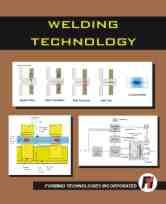|
 Welding
Technology Welding
Technology
1 day course
COURSE OBJECTIVE:
This course provides an introduction to the processes
and equipment used in resistance (spot) welding. You
will review: basic resistance welding, how welds are
made, components and mechanics of a welding system,
pneumatic and hydraulic systems, testing methods and
weld schedules for various materials and coatings.
Click
here for a sample of the manual
WHO SHOULD ATTEND:
All types of Engineers, Product Designers, Tool and
Die Makers and anyone interested in an overall understanding
of resistance welding.
COURSE OUTLINE:
1.0 How a Weld is Made
1.1 Resistance Spot Welding
1.2 Characteristics of the Weld Nugget
1.3 Making a Spot Weld
1.4 Relationship of the Welding Variables
1.5 The Elementary Welding System
2.0 Welding Fixture Secondary Components
2.1 Introduction
2.2 In-line Weld Gun Assembly
2.3 Welding Electrodes (caps)
2.4 Electrode Holder Assembly
2.5 Threaded Adapters
2.6 Tapered Shank Cap Adapters (Barrels)
2.7 Offset Electrode Caps and Adapters
2.8 Water Tubes and Water Tube Adapters
2.9 In-line Welding Gun Cylinders
2.10 Stationary Back-up Electrodes
2.11 Secondary conductors (shunts)
2.12 Welding Fixture Transformers
2.13 Weld Circuit and Power Considerations
2.14 Primary Circuit Power Control
3.0 Secondary System Mechanical Arrangement
3.1 Positioning and Holding Production Parts
3.2 Magnetic Losses
3.3 Electrical Switches
3.4 Water Distribution
3.5 Fixture Color Codes
4.0 Multiple Welding Secondaries
4.1 Weld Power Supply
4.2 Weld Loop Impedance
4.3 Types of Resistance Welding
4.4 Balanced Welding Conditions
4.5 Classes of Welds
5.0 Portable and Robot Spot Welding
5.1 Portable Weld Guns
5.2 Portable Weld Gun Designs
5.3 Transformer Secondary Cables
5.4 Portable Welder Suspension Systems
5.5 Robot Integral Weld Guns
5.6 Color Coding of Components
5.7 Weld Gun Assembly
5.8 Portable and Robot Welding Standards
6.0 Weld Schedules, Metals and Other Variables
6.1 Resistance Spot Welding
6.2 Basic Welding Circuit
6.3 Weld Sequence
6.4 Welding Variables
6.5 Protective Coatings
6.6 Contaminants on the Metal
6.7 Composition of Metal (Metallurgy)
6.8 Weld Heat Balance
6.9 Metals Commonly Resistance Spot Welded
6.10 Multiple Thickness Welds
6.11 Spot Spacing
6.12 Weld Schedules
7.0 Weld Quality and Testing Methods
7.1 Spot Weld Defects
7.2 Corrective Action for Eliminating Spot Weld Defects
7.3 Welding Equipment Testing and Troubleshooting
7.4 Secondary System Maintenance
7.5 General Maintenance
Back to Sheet Metal Assembly
Training Courses
|